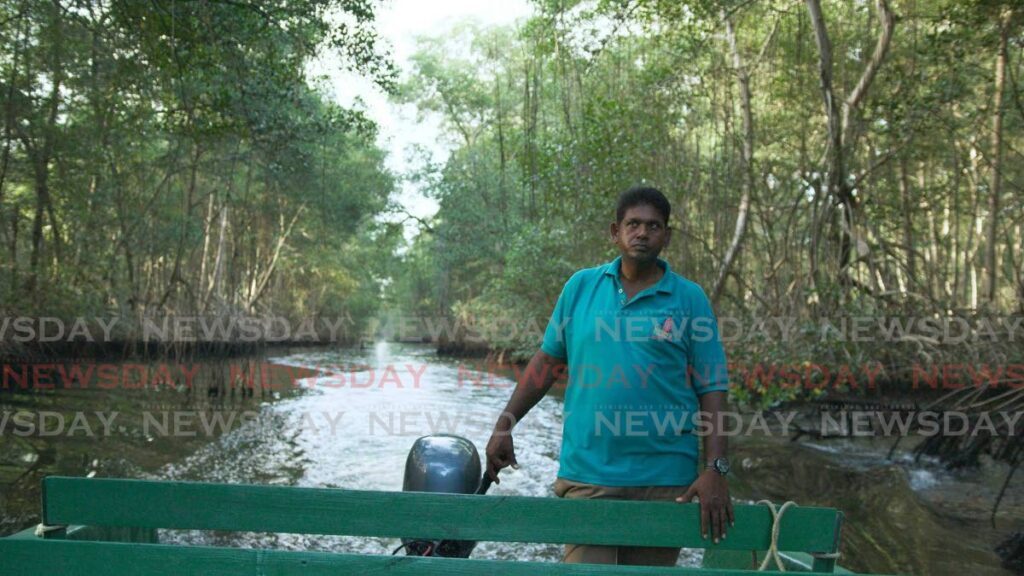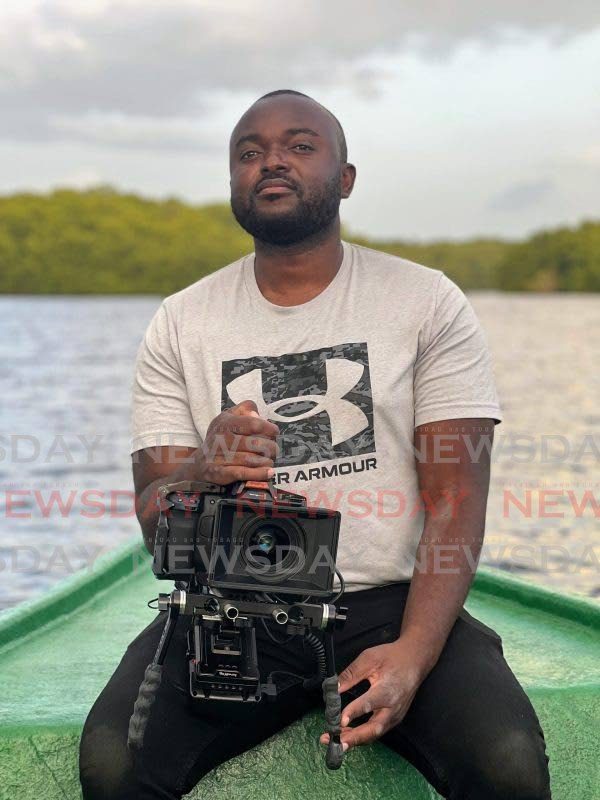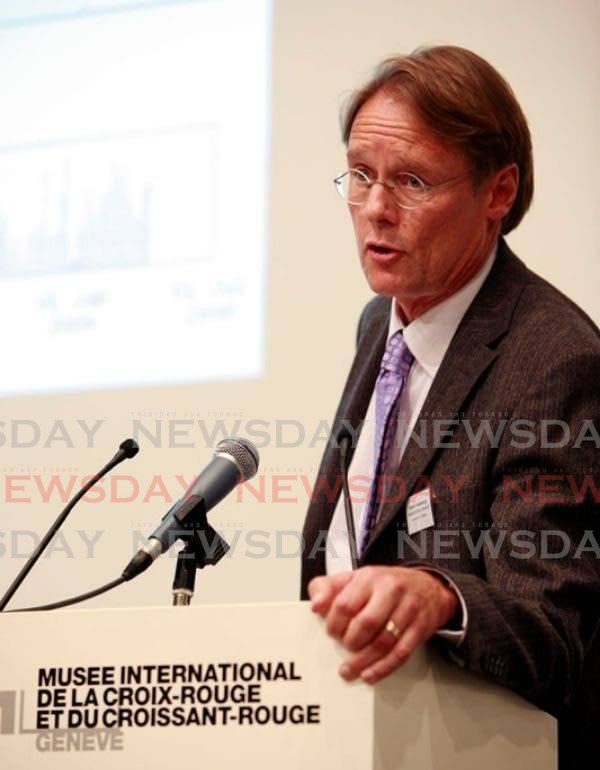Touchstone energy transition documentary features Trinidad and Tobago

Energy and Energy Industries Minister Stuart Young and Mark Loquan president of the National Gas Company were two public figures featured in an energy transition documentary written and produced by energy company Touchstone Explorations' board member Dr Harrie Vredenburg.
Touchstone Explorations president and CEO Paul Baay along with his board (Trinidad) hosted the premiere of the documentary, "Without Leaving Anyone Behind: Exploring Our Way to an Energy Future" on Wednesday night at Mille Fleurs, Queen's Park Savannah.
Baay in his opening remarks, recalled that when Vredenburg first brought the film to his attention, the aspect he found fascinating was the balanced approach to the issue "which we don't hear a lot of as it is usually black and white."
Baay also appeared in the film and described the experience as "fun."
"Thanks for leaving in the boat pictures (footage) of me dancing. He promised me those would be on there," he added to the laughter of the audience.
The film was directed by Sylvester Ndumbi, an award-winning film-maker with over ten years of industry experience producing documentaries, short films, and TV shows.
A 40-minute clip of the 80-minute film was shown, followed by a question-and-answer session.
Ndumbi told the audience the documentary was filmed during a period of a little over two years and in locations all over the world including the UK, Canada, Hawaii, Kenya and TT.
Many Realities
Asked why this country was chosen to be featured, Ndumbi joked that he always finds an excuse to come back because he loves doubles.
"It's like a small island that has many realities at once. You have the Port of Spain and the energy industry here, and you have Icacos where you can see the sea level rising and what's going on there. So, you have many realities in a very compact place," he said.
During the film there was an interview with a resident of Icacos who spoke about his childhood home disappearing underwater.
The film also touched on the shutdown of the Petrotrin refinery and how many workers lost their jobs, visited the Caroni Bird Sanctuary with Nanan's Tours and also featured Touchstone general manager operations Christopher George and exploration manager Xavier Moonan.

Photo courtesy Julien Neaves -
Vredenburg, a University of Calgary professor and one of the world’s leading experts on energy, climate change, and economics, said while he is Canadian and Dutch, he came to the Caribbean from a young age and before becoming an academic worked in the tourism industry.
He added that he has been throughout the region and also Latin America. He noted he was a Touchstone board member and previously taught at TT Institute of Technology, the precursor to the University of TT.
"So, I had a real sense of the developing countries of the global south. So, when I look at the news and read the stuff about climate change it is always a global north perspective and there is rarely ever a southern developing country perspective. So, to me it was very important to come to the global south and Trinidad specifically."
He said fossil fuels are important to the Caribbean and also Barbados which is a leader in renewable energy.
"Lots of sun. Lots of solar energy. Lots of wind. Now getting into green hydrogen as well."
He added that Barbados, like TT, is one of the wealthier Caribbean countries and its economy is largely built on fossil fuels including tourism which has tourists flying in from around the world.
Vredenburg said one of the reasons they were doing the film is because they are optimistic that the energy transition can be done.
"No one is going to say, 'okay, TT, you've had a good run so far. Shut it all down and go and find something else to do.' That's not gonna happen. Nor will it happen in Barbados to say shut down the tourism industry, financial services. It's not going to happen anywhere. Everybody wants to have a decent quality of life."
He said there are technologies and over time they will get cheaper, though there are scientific limits to what can be done.
"But I think we can do things quite a bit better than we do right now."
He said many people believe they have the answers, but the purpose of the film was to explore the different technologies."
No Switch
Energy Minister Stuart Young in his segment of the film stressed that there was no "switch" to be pressed that would immediately transition the economy.
NGC President Mark Loquan during the question-and-answer segment said one of the perspectives that we keep hearing is about there not being an "on/off switch."
"But are you covering in the remaining parts (of the film) some of the barriers that prevent us from going as far as possible? Because somehow that narrative, that conversation, seems to be missing in terms of the inability to scale up the technology. What exists. What doesn't exist. The size and scale. The magnitude that we are talking about. The money required. Is that covered in the remaining parts of the documentary?"
Vredenburg said in the second half of the documentary which was not shown they do get into the technology aspect.
"I know there are many engineers and technology people in the audience."

He pointed out the subtitle was "Exploring Our Way to an Energy Future" and explained the documentary starts off with renewables, which is the "knee jerk" response, and includes their visit to Hawaii where renewables work quite well but may not work somewhere else.
"It all depends on what you have locally and…what type of financing (you have)."
He added the documentary also looks at technologies like decarbonising and carbon capture, blue hydrogen, green hydrogen, and even "out there" technologies like direct air capture which is something very few people know about.
Vredenburg said the film was being looked at by Netflix and Amazon Prime and if one of the streaming services like the content they may finance a longer, multi-episode series, possibly four to six episodes.
"This is a very complex issue. Many of you work in the energy industry and would understand how complex this is."
Ndumbi said they recorded 70 terabytes of footage and 50 hours which had to be cut down including global leaders speaking at length. He explained a miniseries would be better able to develop each topic and "dive deep" into it.
Asked what sparked the idea for the film, Vredenburg said he had done a lot of research on the area and had been writing a book that is two thirds complete.
"It's not going to get finished. I got tired of it. And I got thinking 'The world is changing in terms of how we communicate...and how we respond to information."
He recalled he met Ndumbi years ago when the director had reached out to him about appearing in his documentary about Africa called Motherland.
During covid while attempting to finish his book he met with Ndumbi and they discussed doing a documentary film.
"For me it was just money," Ndumbi quipped to loud laughter from the audience.
He said one of the films he did before was a documentary on pipeline wars.
"And I have always been fascinated because the debate is so polarised. I think we are at the point where people are not even listening to each other. And when I look at Harrie and the work he has done, (it) is really a very balanced approach...(and) he just wants to showcase what's going on," he said.

Comments
"Touchstone energy transition documentary features Trinidad and Tobago"